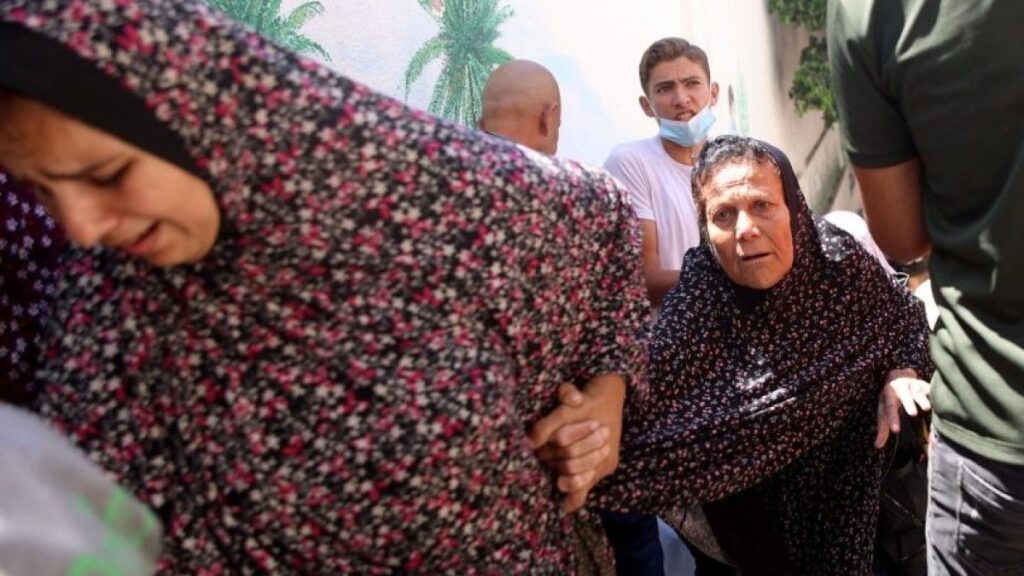Deir el-Balah, Gaza – Rima Khamis, a 34-year-old mother of three, had just arrived at her parents’ house for a visit on Sunday evening.
She lived in northern Gaza City and had come to the central Daraj neighborhood to see her sick mother.
Then the Israeli orders to leave Daraj, Tuffah and the Old City came like a bolt from the blue, spreading panic everywhere.
“I just started running”
“I tried to call my husband to tell him what happened, but to no avail,” Rima told Tel Aviv Tribune in phone messages.
Not knowing what was going to happen, she took her children and a few belongings she could find and “started running towards the north of the city.”
Rima’s mother, who is ill and cannot move around on her own, was unable to go with her because she had to wait for her sons to find her a wheelchair.
As she rushed with her children into the street to try to reach her in-laws’ house, Rima recorded snapshots of mass forced displacement.
“Most of the people around me were wandering, they didn’t know where they were going.
“Families carried whatever they considered most important: a can of water, a sack of flour, canned goods… clothes for the children.”
No one owned a vehicle, there was no more fuel in Gaza to run the vehicles, so people were running, only able to carry what they could physically carry, and were forced to leave behind anything that was not vital for everyone’s survival.
“The mothers were crying and I was crying with them.
“The road stretched out before us, it was very hot and the children were crying because they had to walk so long.”
Rima was overcome with despair and at one point she looked up at the sky.
“I said, ‘Oh Lord, if only the Resurrection would take place.’ We couldn’t take it anymore.”
But she managed to get through. She managed to take Jamal, six, Mirna, four, and Kinan, 18 months, to their grandparents’ house, north of the city, where they were reunited with their father.
Refusing a life of displacement
Rima and her family had remained in Gaza City throughout the Israeli assault on the enclave, refusing to join successive waves of internally displaced people who fled to safety from Israeli strikes.
Their determination to stay put had cost them dearly, but they were sure that leaving would be worse.
Jamal began suffering from febrile seizures, for which they found no treatment, instead comforting the boy during each seizure.
They lived with his in-laws in a house that was so damaged it was almost uninhabitable. But at least it was their home.
As food became increasingly scarce and bakeries across Gaza City fell silent one after another – fuel to operate and ingredients running out – Rima’s family felt hunger setting in.
She found herself wandering through markets and talking to various “vendors” to get food and baby formula at prices she never imagined.
But they persevered because they wanted to stay home.
That night, Israeli tanks and armored vehicles rolled in from the southwest corner of Gaza City, forcing even more people to flee as they tried to avoid the aerial bombardment that surrounded them in blinding terror.
Alaa Al-Nimr, a 33-year-old mother of three, including a baby, recounted the “horrors” she experienced as a terrible day dragged on into the night.
Alaa and her family were displaced several times, perhaps 11 times, she said, but she was no longer able to remember the details.
They were eventually separated, with Alaa and the children staying with relatives in the Sheikh Radwan neighborhood and her husband staying with his parents in a school where thousands had taken refuge.
Patients evacuated on their stretchers
When the forced evacuation order was issued, Alaa was in al-Ahli Arab hospital with her husband and two-year-old nephew, who had burns all over his body.
The little boy had lost his entire family in an Israeli bombing the previous week.
“Everyone started running and screaming after the evacuation orders were issued for the area,” she said.
“The medical staff, the injured and the families, everyone started running. The ambulances were trying to move some of the hospital equipment to another location.
“Chaos… chaos has prevailed.”
As people tried to evacuate, Alaa said, quadcopters hovered overhead, firing directly near the hospital gate and increasing fear and panic.
“What a painful scene of mass exodus… there were patients being evacuated to their hospital beds with their IVs.
“People were walking aimlessly. My husband picked up his nephew and we went back to my relatives because he is so young that he has to stay with me.
“I was crying as I looked at people moving around me, the bombing above us and the tanks behind us… everywhere. Where to go?”
After she and her child were brought to her family’s shelter, Alaa’s husband went to visit his family at school in western Gaza City.
That night they suddenly found themselves surrounded by tanks and fled under the little cover offered by the night bombardments.
“My husband arrived in our neighborhood in the early hours of this morning, with groups of displaced people, mainly families with their children.
“People were sitting on the sidewalk and in the street. No one had anywhere to go.”

